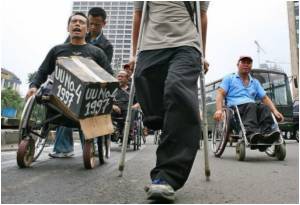
“Our data don’t tell us exactly what psychological processes are responsible,” says Michael Poulin, “but we hypothesize that people may be hardwired so that actively attending to the concrete needs and feelings of others reduces our personal anxiety.”
The study found that passive care, on the other hand, which requires the spouse to simply be nearby in case anything should go wrong, provokes negative emotions in the caretaker, and leads to fewer positive emotions.
The study involved 73 subjects (mean age was 71.5 years, age range was 35-89 years) who were providing full-time home care to an ailing spouse. Participants carried Palm Pilots that beeped randomly to signal them to report how much time they had spent actively helping and/or being on call since the last beep, the activities they actually engaged in and their emotional state at that moment.
The researchers found no moderating effects of age on the association between helping and well-being. In other words, helping predicted positive and negative effects similarly for adults of all ages. One variable that did affect outcome was the level of perceived interdependence with the spouse experienced by the caregiver — that is, the extent to which caregivers viewed themselves as sharing a mutually beneficial relationship with their spouse.
“For interdependent couples, the positive effects of active care were particularly strong,” Poulin says, adding that this outcome supports the prediction that “individuals should derive the greatest satisfaction out of helping those with whom they perceive a shared physical or emotional fate.”
Advertisement
“Overall,” he says, “we wouldn’t say that caring for an ailing loved one is going to be good for you or healthy for you, but certain activities may be beneficial, especially in high-quality relationships.”
Advertisement
“Does a Helping Hand Mean a Heavy Heart?” - the study by Poulin and five co-authors from the University of Michigan Department of Internal Medicine, has been published in the journalPsychology and Aging (2010, Vol. 25., No. 1).
Source-Medindia







